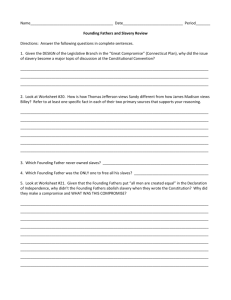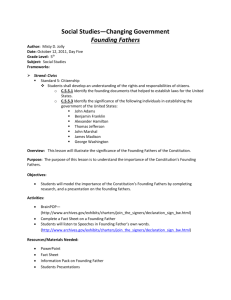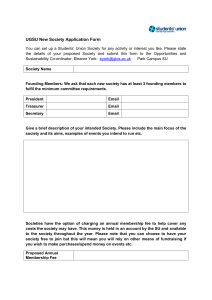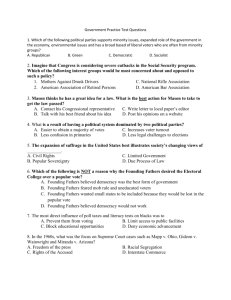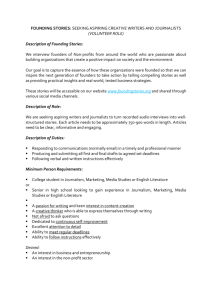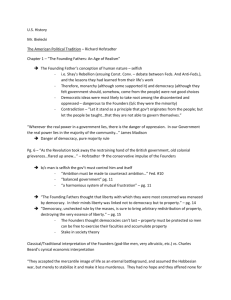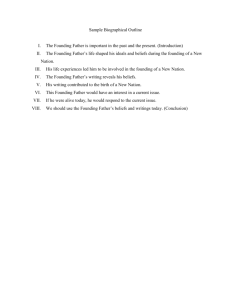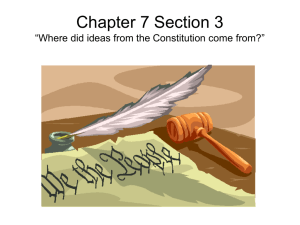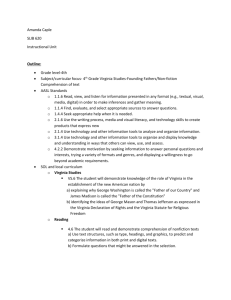finalannotatedbib
advertisement
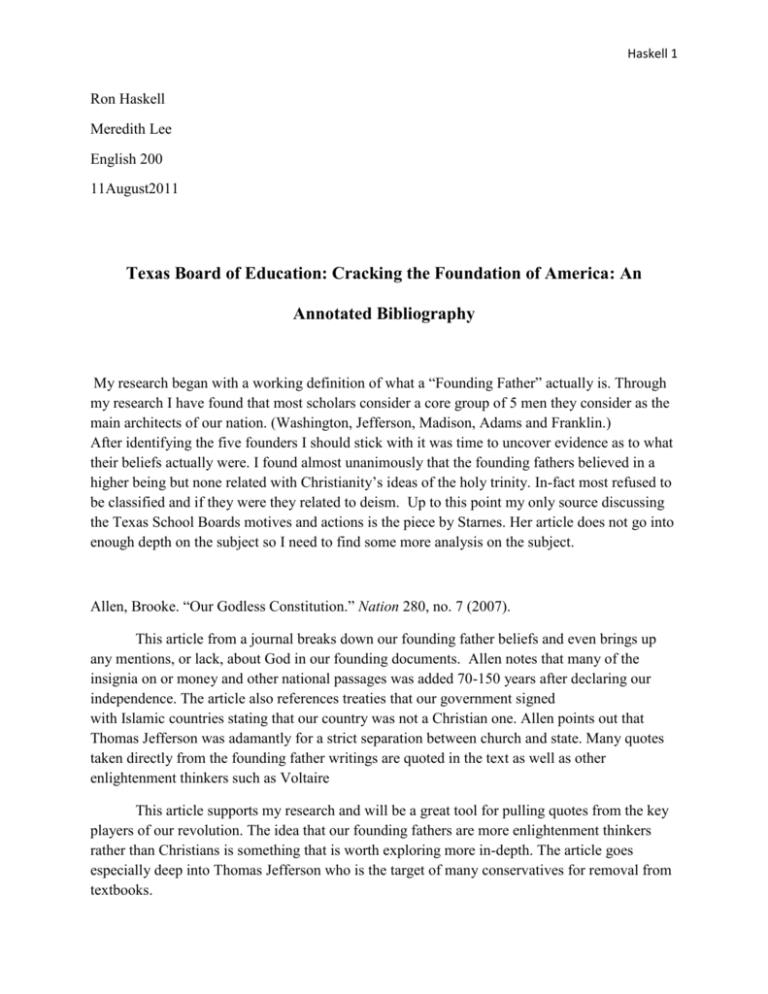
Haskell 1 Ron Haskell Meredith Lee English 200 11August2011 Texas Board of Education: Cracking the Foundation of America: An Annotated Bibliography My research began with a working definition of what a “Founding Father” actually is. Through my research I have found that most scholars consider a core group of 5 men they consider as the main architects of our nation. (Washington, Jefferson, Madison, Adams and Franklin.) After identifying the five founders I should stick with it was time to uncover evidence as to what their beliefs actually were. I found almost unanimously that the founding fathers believed in a higher being but none related with Christianity’s ideas of the holy trinity. In-fact most refused to be classified and if they were they related to deism. Up to this point my only source discussing the Texas School Boards motives and actions is the piece by Starnes. Her article does not go into enough depth on the subject so I need to find some more analysis on the subject. Allen, Brooke. “Our Godless Constitution.” Nation 280, no. 7 (2007). This article from a journal breaks down our founding father beliefs and even brings up any mentions, or lack, about God in our founding documents. Allen notes that many of the insignia on or money and other national passages was added 70-150 years after declaring our independence. The article also references treaties that our government signed with Islamic countries stating that our country was not a Christian one. Allen points out that Thomas Jefferson was adamantly for a strict separation between church and state. Many quotes taken directly from the founding father writings are quoted in the text as well as other enlightenment thinkers such as Voltaire This article supports my research and will be a great tool for pulling quotes from the key players of our revolution. The idea that our founding fathers are more enlightenment thinkers rather than Christians is something that is worth exploring more in-depth. The article goes especially deep into Thomas Jefferson who is the target of many conservatives for removal from textbooks. Haskell 2 Bernstein,R.B.. Founding Father Reconsidered. Oxford University Press, 2009 The author, R.B. Bernstein, begins by defining what exactly constitutes a founding father. He notes that the founding fathers themselves have been deified by many people. He lists some people who qualify as founding fathers. These people include George Washington, Ben Franklin, Thomas Jefferson, John Adams, James Madison, Alexander Hamilton and John Jay. Bernstein explains how the founding fathers ascended to a place where they could be considered for the positions they eventually filled. Bernstein gives examples of what these core seven founding fathers actually accomplished and what that meant towards America’s independence. Bernstein also discusses how we remember the founding fathers and how their legacies affect us today. This source will be good for background information, but lacks direct facts to add to my argument. The book contains great background on the founders and how they came to be prominent individuals during the revolution, but lacks useable information on their religious beliefs. Holmes,David L. Faiths of the Founding Fathers. Cary N.C.: Oxford University Press, 2006. He breaks down what religion actually meant in the late 18th century especially our founding fathers propensity to look towards deism. Holmes breaks down six of the main founding fathers individually and discusses their views and actions separately. Holmes asserts the founding fathers were very cryptic in letting others know what they believed and many of their public stances were contradictory with their private practices. Holmes proves his unbiased view by discussing the orthodox Christian practices of the founding fathers wives and notes a few founding fathers that were more Christian than others. Holmes book will be the cornerstone of my paper. This book contains great facts about the religious culture of America before and during the revolution which sheds light on how the founder’s religious beliefs which I can use to show why the founders believed what they believed. The quotes and letter between the founders will be useful as citations in my paper. Meachem,Jon. American Gospel: God, the Founding Fathers, and the Making of a Nation. Westminster : Random House, 2006. The book begins by recalling much of Jefferson’s beliefs on religion. Meachem notes that Jefferson, like most other founding fathers, was most likely a deist rather than orthodox Christian. The book then moves into some very interesting material about how the initial settlements in America were anything but tolerant to other religions. After discussing the Haskell 3 initial settlements, Meachem looks in-depth into Jefferson and the other founding fathers beliefs during the revolution including many accounts from inside the room where congress debated the actual wording for our Declaration of Independence. From part 3 on the book discusses the views of other leaders of America from the Civil War all the way to present day. This source will work towards my research because of the detail it goes in to. Meachem cites many conversations between the founding fathers during the revolution. There are even discussions recorded from inside the room where some of the most important documents were drafted. This source will also be useful as a reference towards religion in America during the 100 years prior to the revolution. Shorto, Russell. "How Christian Were the Founders?." February 11th, 2010.http://www.nytimes.com/2010/02/14/magazine/14texbooks-t.html?pagewanted=9 (accessed August 1st, 2011). Shorto covers the issue with the Texas Board of Education in depth. He has interviewed two members of the school board and has done background research on a few others. Shorto lists the many of the issues that the Board has attacked and gives their reasoning. The piece also interviews one of the “experts” hired and subsequently ignored by the Board as part of the process to decide the content of textbooks. This source will be a great piece for my paper as it has plenty of facts about the Board of Education and their backgrounds. Bringing to light their backgrounds will help me undermine the credibility of their argument while advancing my own. Starnes, Bobby A.. “AND THE BEAT GOES ON” Phi Delta Kappan. 92. 3 (2010), 74-75, http://www.kappanmagazine.org/content/92/3/74.short. (accessed July 29, 2011). This short article argues that textbooks and what goes into them are being used by politicians as a way to gain political support. The author tells a story about an experience she had with a school in Ohio and how politicizing the education process affected that school district. The article is wrapped up with a quick discussion on the issue with the Texas state school board and their attempt to highlight only the history their political party wishes to highlight. This article, although brief should help me with my paper. It brings to light the process of what goes into our textbooks and how that process is highly politicized. The source lacks good data and does not go in-depth on the topic. Starnes idea’s about politicizing the education process is worth researching. Haskell 4 Stutz, Terrence. "Texas State Board of Education approves new curriculum standards." Dallas Morning Star, sec. Education, May 22, 2010. http://www.dallasnews.com/news/education/headlines/20100521 Texas-State-Board-of-Education-approves-9206.ece (accessed August 06, 2011). This article is a report about the decision by the Texas Board of Education to change th e content in textbooks. The article shows great turmoil between political lines and offers up quotes from both sides of the argument. The article lists specifically what the Board of Education is changing and suggests the issue is a political, rather than religious issue. The article in The Dallas Morning News will be another good source for pulling quotations from board members. I believe an article from a newspaper geographically located right in the middle of the debate in Texas will add credibility to m y argument. This article is strictly useable for citing information about the school board and has little information on the founders.
